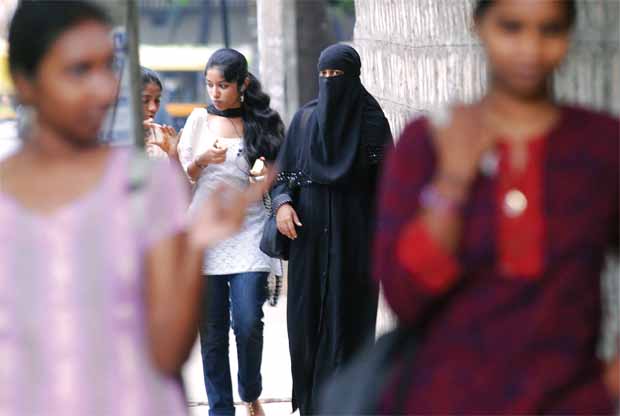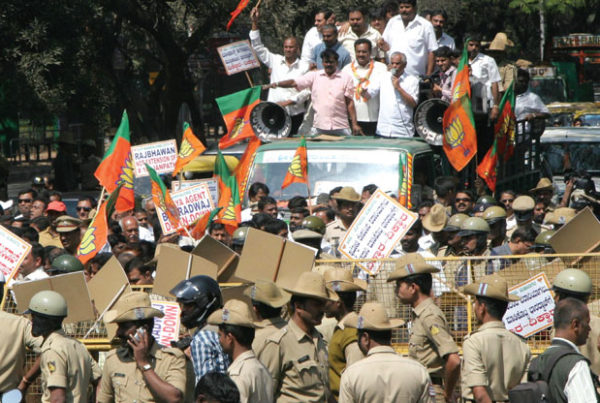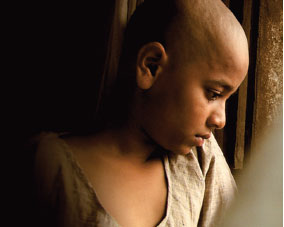The ABVP and Bajrang Dal are aggressively enforcing a burka ban in colleges in Karnataka’s Dakshin Kannada district, reports Sanjana Chappalli
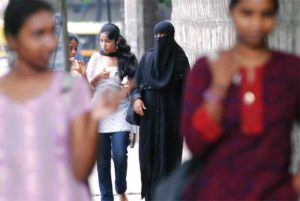 Scarf knot The ban is forcing students in burkas to worry about their safety
Scarf knot The ban is forcing students in burkas to worry about their safetyPhotos: S Radhakrishna
IN JUNE this year, President Nicolas Sarkozy denounced the burka, the traditional women’s garment that Muslim women adopt to cover themselves from head to toe, calling it “a sign of subservience” which “would not be welcome in the French Republic.” Unmindful of protests from Muslims worldwide, the French National Assembly instituted a commission of inquiry the very next day to decide if women should be allowed to wear the burka publicly in France.
More than 8,000 kilometres away, across continents and countries, Muslim women in Karnataka’s Dakshina Kannada district have already been handed such a diktat. Women wearing burkas — or even headscarves for that matter —will not be allowed into college classrooms and campuses in the region, state the Akhil Bharatiya Vidyarthi Parishad (ABVP), a students’ organisation and the youth wing of the Bajrang Dal. Both the ABVP and the Bajrang Dal are affiliated with the BJP, which is in power in the state. Though there is no legal backing for the ban, the decree has been enforced by government and government- aided colleges in the region. Since March 2009, the ban has applied universally to students and lecturers and has been aggressively enforced across colleges. Those daring to disobey have been suspended, asked to leave college and threatened with physical violence.
Says Aysha Ashmin, an 18-year-old student from Bantwal in Dakshina Kannada district, “Initially, Muslim women were asked to remove their burkas before entering class rooms. A month later, this was extended slightly – no burkas in college campuses they said. So women hurriedly changed out of these either at the gate or in the ladies room as soon as we entered colleges. Now, they are asking us to remove our head scarves before entering classrooms.” This is a stricture that Aysha experienced first hand. Within days of enrolling in the BCom course at the Sri Venkataramana Swamy Degree College in Bantwal, Aysha stopped wearing her burka in classrooms. Her classmates insisted she do so, saying it would only single her out for attention since Muslim students wearing the burka were rare on campus. It didn’t take much persuasion, as she wanted to fit in and make friends in her new college. In any case, she told herself, she had her headscarf on. A few weeks later, the newly elected president of the college student’s union began targeting Aysha for wearing the headscarf. “The president and some other union members would follow me everywhere and ridicule me for wearing a headscarf. They claimed my headscarf was unnecessarily escalating tensions within the college, that if I insisted on wearing it, they would be forced to wear saffron shawls. When the jibes turned into physical attacks, I asked them to hand me the saffron shawl – I would wear that and my scarf,” said Aysha.
Days later, Aysha was summoned by the principal and asked to stop wearing the headscarf. With Aysha was Azramma, the only other Muslim student who wore one on campus. When both students refused to remove their scarves citing religious beliefs and personal discomfort within the slightly hostile coeducational environment, they were asked to return the next day with their parents. In the meeting on August 7, the girls and their parents were bluntly told that if they refused to comply with the ban, they would be suspended and subsequently removed from college. While Azramma acquiesced, Aysha did not relent. Her father, Mahmood P was shocked at the rude behaviour of the lecturers who asked his daughter to either chose religion or education, arguing that here was no space for both on campus. “My daughter was told that nobody would look at her even if she removed her scarf since there were far more beautiful girls on campus! And this was the least vulgar thing they said. Along with the principal, there were senior lecturers and heads of departments present at the meeting. Even though I asked them to give me the reason for suspension in writing, they turned us away,” says an exasperated Mahmood. Aysha’s suspension has meant a loss of the Rs 7,000 her family has paid as annual fees. Besides, if her appeals to Mangalore University’s Vice- Chancellor fail, she is likely to lose an academic year. “Admissions have closed everywhere but I will continue to fight. Education is my right, just as practising my faith is,” says a determined Aysha.
There are several others who do not share Aysha’s ample courage. A lecturer at the same college, Mumtaz, chose to leave after having worked for 15 days. Afraid even to reveal her last name, Mumtaz was accosted by a fellow lecturer for wearing the headscarf. “He asked me, ‘If we insist on following our religious practices within educational institutions, what would happen if Digambar Jains decided to do the same and turn up naked?’ We were apparently guilty of violating the social order,” says Mumtaz. A resignation letter she wrote spelling out these reasons was refused by the college management.
When TEHELKA contacted Seetaram Mayya, the college principal, all he would admit to was pressure from various Hindutva organisations to enforce the ban against headscarves. Though there were no names of organizations or people forthcoming, Mayya admitted to the presence of members from these organisations within the college as well.
THE SITUATION in the Bantwal College resonates right across the district. On August 17, in Uppinangady, 55 kilometres from Mangalore, all 82 Muslim women enrolled into the Government Degree College there were upbraided for wearing headscarves. Days after Sujith KS, an ABVP member won the college student union elections, the Muslim women were summoned by Principal Vasanta Kumari and asked to stop wearing headscarves within classrooms. Ten students who steadfastly refused to do so were asked to leave the classrooms immediately. Two final year students — both boys — who intervened and defended the women’s religious rights to wear headscarves were suspended by the college principal. In the evening, when parents accompanied by a lawyer went to the principal’s house to discuss the matter, they were turned away. Mohammed Rafique, a local resident and activist with the People’s Front of India (a Muslim organization active in the area) told TEHELKA, “The principal turned us away, saying there was nothing she could do. We tried to tell her that Muslim women had attended the college wearing burkas for 25 years. It was of no use.”
‘The president and union members would follow me and ridicule me for wearing a headscarf’ Aysha Ashmin, Student
The following day, the situation in the college grew worse. Following an expression of fear by the college principal, police bandobast was arranged. The ten students continued to be locked out of their classes and the rest were made to remove their headscarves. Despite repeated attempts by TEHELKA, the college management refused to discuss the legality of their headscarf ban. A college official who refused to identify himself boasted, “It is an internal matter. We will handle it ourselves. We don’t have to explain anything to anybody.”
MUMTAZ WAS ACCOSTED BY A FELLOW LECTURER FOR WEARING THE HEADSCARF. SHE LEFT AFTER 15 DAYS
INTERESTINGLY, THE ban on Muslim students wearing burkas and head scarves has spread to Christian missionary colleges as well. Students of St. Agnes College, St. Anne’s College and St. Aloysius College in Mangalore speak quietly of the authorities asking them to stop wearing burkas and headscarves. Confirming this as official policy, Dr. (Sr.) Prem D’Souza told TEHELKA that while they respect all religions and faiths, they couldn’t accept headscarves as an expression of faith or as a religious choice for Muslim women. “We don’t allow this since there is no uniformity – some women wear the headscarf while others don’t. Ultimately, we want to ensure that they do not face any discrimination. Wearing the scarf will single them out,” explained Dr. D’Souza. When queried why nuns could continue to wear habits and wimples and not fall foul of the headscarf ban, she said merely that they belonged to a different category.
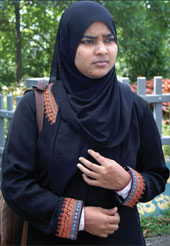 Since March 2009, there have been six incidents of colleges in Dakshin Kannada district banning headscarves and burkas – a number dismissed as insignificant by several people including ABVP student representative Shailesh Shetty. Shetty, the outgoing president of the student union at University College, Mangalore, claimed that in the next month every single college in the district would follow the same rule. “This is a programme that we have taken seriously. Any union that has AVBP representation will make sure that it will be an issue for the college authorities to address. Why should Muslims be allowed to express their identity? They should remember which country they are living in,” said Shetty, deadpan. If Shetty’s claims are anywhere close to the truth, the road ahead promises to be hard for Muslim women in the district’s colleges. The alternative — one that comes with the promise of further marginalisation — is to shift to colleges that are either run by Muslim educational trusts or ones that specialise in Islamic studies. Both spell disaster, says Hasnath Mansur, the former member of the Karnataka State Minorities Commission and principal of Abbas Khan college for women. “Why should women sacrifice education for what is a minor point? As long as they keep their heads covered — even withdupattas — they will comply with religious and cultural customs.”
Since March 2009, there have been six incidents of colleges in Dakshin Kannada district banning headscarves and burkas – a number dismissed as insignificant by several people including ABVP student representative Shailesh Shetty. Shetty, the outgoing president of the student union at University College, Mangalore, claimed that in the next month every single college in the district would follow the same rule. “This is a programme that we have taken seriously. Any union that has AVBP representation will make sure that it will be an issue for the college authorities to address. Why should Muslims be allowed to express their identity? They should remember which country they are living in,” said Shetty, deadpan. If Shetty’s claims are anywhere close to the truth, the road ahead promises to be hard for Muslim women in the district’s colleges. The alternative — one that comes with the promise of further marginalisation — is to shift to colleges that are either run by Muslim educational trusts or ones that specialise in Islamic studies. Both spell disaster, says Hasnath Mansur, the former member of the Karnataka State Minorities Commission and principal of Abbas Khan college for women. “Why should women sacrifice education for what is a minor point? As long as they keep their heads covered — even withdupattas — they will comply with religious and cultural customs.”
‘Why should Muslims be allowed to express their identity?’
Shailesh Shetty, ABVP representative
Eclipsed in the ongoing theatre of coercion is the debate raised in France’s parliament houses and in seminars organised by women’s rights organisations everywhere. Is a burka or a head scarf a symbol of oppression for Muslim women? Does freedom of choice really exist? Mansur minces no words: “The current move by the Hindutva forces clearly takes us outside the ambit of that discussion. This perverse move is aimed at denying women education and stigmatising an entire community. Why is the government not withdrawing aid and recognition from institutions that are fostering hatred and divisiveness?”
—
This article was originally published in Tehelka, a leading independent news magazine in India, known for its investigative journalism.
